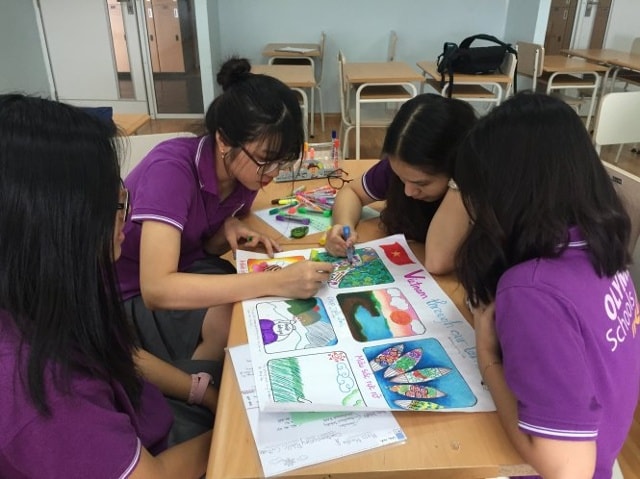Learn how to choose a career
At Olympia High School (Hanoi), choosing a career must be learned, and learned for real.
If anyone had the chance to attend the seminar held at Olympia School at the end of September, with an extremely serious topic (simulating the negotiation process, difficulties and advantages of Vietnam when joining the Trans-Pacific Partnership Agreement - TPP), they would be surprised to see that the organizers and participants were all students!
Act like a real person
 |
| Students discuss in a media class at Olympia High School, Hanoi - Photo: VINH HA |
Many parents and attendees of the above-mentioned conference thought: “What do 15-17 year olds know about such big things?”... However, when witnessing students playing the roles of policy makers, economic researchers, business representatives, journalists... all those concerns disappeared.
The group of students playing the role of business representatives had to present about the opportunities and challenges when Vietnam joined the TPP, analyzing the advantages and disadvantages...
To do this, students of the "economic group" (12th graders) had to find documents and read to understand the concepts related to the above topic, learn about Vietnam's negotiation process when joining the TPP... Based on their understanding of this content, students designed a realistic "scenario" for the seminar.
Meanwhile, the “media group” (11th grade students) played the role of the event organizers, who were the ones responsible for planning and organizing the conference.
Students playing the role of journalists must practice attending and reporting on seminars, preparing questions to interview experts and businesses...
With this role assignment, the group of 11th and 12th grade students carried out a workshop from A to Z with the participation of many participants, while the teachers were just "observers"!
This is one of many practical lessons in a career orientation course, and students' performance is the basis for teachers' assessment instead of traditional tests.
Economics, culture & mass media are two of several career-oriented subject groups that Olympia High School is teaching to students.
Teaching these subjects is not limited to the traditional classroom space, with theoretical lectures, but aims to provide students with a simulated space about future careers, real-life situations for them to experience and practice...
Ms. Ngo Minh Trang, teacher in charge of the economic career orientation class, said that organizing students to learn through experiential activities has helped them deepen their knowledge and form the necessary skills for future careers.
Ms. Bui Tra My, a teacher of culture and mass media, said that students at Olympia School from grades 9 to 12 have 2 periods per week to study "open" subjects that guide their future careers.
And to prepare for lessons beyond the classroom, students must prepare in advance by reading materials, discussing, and assigning tasks in groups to work together.
“Put the advice in the drawer”
The future career orientation subjects that Olympia High School is implementing have in common that they are not heavy on theory but focus on creating situations and environments for students to get acquainted and try to do.
“That way of learning makes students feel that the lessons are light, interesting and not overloaded, when they have to study compulsory subjects in the program at the same time,” Ms. Tra My shared.
With another subject of Olympia School, the medical and pharmaceutical group, teachers initiated the presentation of scientific research ideas related to protecting human health, attracting the attention of many students and really making them excited.
“Dozens of student topics have been sent to us. Some of the ideas are very crazy. But in that childish naivety, there is a serious attitude and way of thinking that makes adults startled,” said Ms. Nguyen Thi Mai Ha, head of the HELP department, coordinator of the career orientation program.
A student's topic has a very literary name "The whole sky is hazy". This student commented that the sky in Hanoi is always hazy with dust and smoke, rarely has the clarity like other places. This very interesting way of posing the problem leads to an opinion about the state of environmental pollution in Hanoi, the causes and attitudes towards life...
Another student chose the topic of lead poisoning, warning about the risk that can occur in the living environment of each family, in markets, supermarkets... There are topics by students giving recommendations on "should or should not eat a lot of fast food?", how to limit smoking, how to grow clean vegetables on diapers, how to save electricity effectively...
“The way students perceive and pose problems may not be true scientific research ideas, but we still encourage them and try to open them up. Because that is the beginning of passions, for a long-term path of searching for knowledge. Therefore, we do not give advice that is too formulaic or boxed. A teacher at my school once used the phrase “put advice in a drawer” to express this general principle,” said Ms. Mai Ha.
According to Tuoitre
| RELATED NEWS |
|---|
